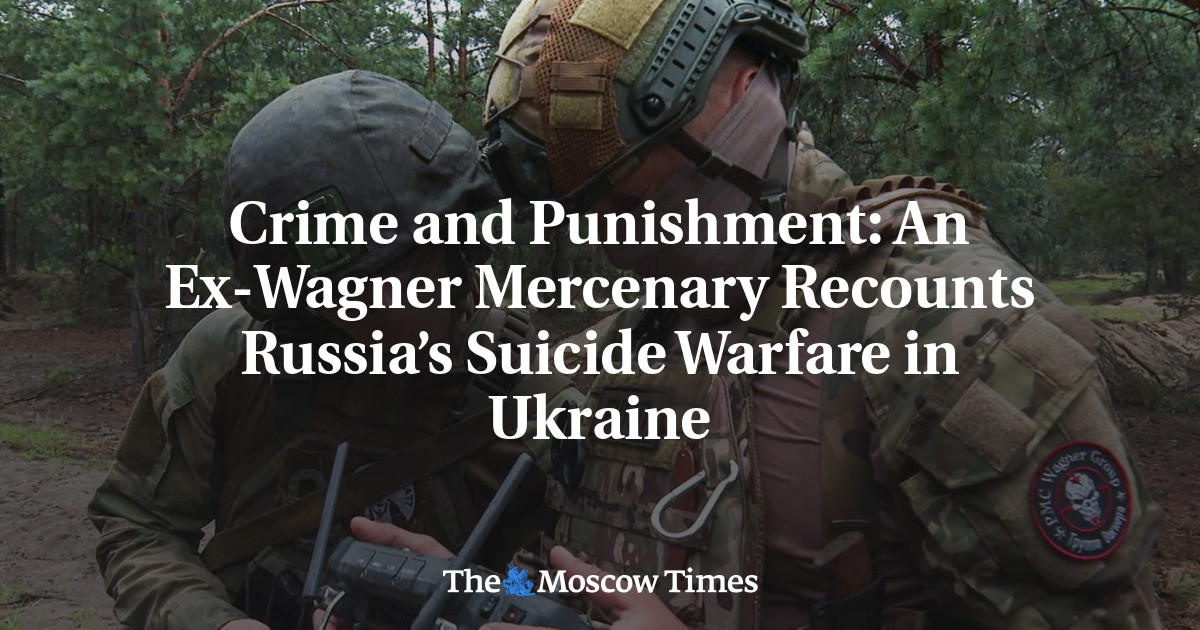
Crime and Punishment: An Ex-Wagner Mercenary Recounts Russia’s Suicide Warfare in Ukraine
How did your country report this? Share your view in the comments.
Diverging Reports Breakdown
Crime and Punishment: An Ex-Wagner Mercenary Recounts Russia’s Suicide Warfare in Ukraine
Alexander Platov was in prison for murdering his wife when an unexpected opportunity arose. In 2022, he was recruited into the Wagner mercenary group to fight in Russia’s invasion of Ukraine in exchange for a pardon. After surviving a suicide assault and sustaining severe shrapnel wounds, Platov shared his story with The Moscow Times. Platov signed a new contract with the Defense Ministry and returned to the front at the end of 2024. But this time, the former mercenary and his fellow ex-convicts were treated as expendable, he said. The treatment Platov described is similar to how newly recruited convicts are handled today, a human rights activist said. He added that military contracts for convicts now last until the end. of the war, and men who sign them have virtually no rights. “Several penal battalions exist, like Storm Z or Storm Z-Battalion,” he said, “but there are no real Wagner guys here” The Defense Ministry did not immediately respond to The MoscowTimes’ request for comment.
Security officers at penal colony in Russia. Yevgeny Yepanchintsev / TASS
Borovskikh said people like Platov suffer from compounded trauma. Many reoffend, return to prison and sign up for military service again. After signing a contract with the Defense Ministry, Platov was deployed near the Ukrainian stronghold of Pokrovsk, where he led a storm group under the 110th Motor Rifle Brigade. “The Defense Ministry tossed us into this militia like dogs. On paper, it’s the spetsnaz. In reality, they’re sending ex-cons and Chechnya vets. No retreats, no vacations. Maybe [you’ll get one] in two years, if they find your skeleton and identify it,” he said. The treatment Platov described is similar to how newly recruited convicts are handled today. According to Borovskikh, military contracts for convicts now last until the end of the war, and men who sign them have virtually no rights. “Several penal battalions exist, like this brigade or Storm Z. Most have no families. Their lives are entirely in the hands of their commanders. Those with experience may be useful. The rest? Just meat for assaults,” Borovskikh said. Platov said he believes the 110th Brigade exists in part to “punish” former Wagner fighters. “There are no real Wagner guys here, just ex-cons, the leftovers. If the real Wagner units came back from Africa or Belarus, Ukraine would be f***ed. Russia would be f***ed too,” he said. “The only thing they gave us was a rifle. Everything else, from underwear to helmets, we had to buy ourselves. Our salaries, ranging from 210,000 to 250,000 rubles ($2,300 to $2,750), get eaten up by food, gear, everything. You survive however you can.”
Platov said the brigade made no progress near Pokrovsk. His first mission was to capture the village of Zelene Pole, which his platoon managed to do. Then came rotation. “They sent in replacements: naval infantry. Contract soldiers from the Black Sea Fleet. The fleet doesn’t even exist anymore. Twenty-five ships sunk,” he said. “One marine hadn’t held a rifle since his oath ceremony 20 years ago. They told him he’d be guarding f**king kindergartens in Donetsk.” Instead, he said, the marines were thrown into the frontline forests with only basic assault rifles and two magazines each. Soon after arriving, an American Bradley fighting vehicle approached, opened fire at 200 meters, deployed infantry and wiped out the detachment before pulling back. “They [the Ukrainians] didn’t even bother to occupy the position,” Platov added. “If they had known how bad the situation was, they would have taken all three of our lines.” The platoon’s next mission proved to be fatal to Platov’s comrades and nearly killed him as well. He blamed not the enemy, but the incompetence and brutality of his own command.
The platoon was dropped 25 kilometers ahead of friendly lines near Ocheretyne with no support and minimal supplies. “We were told to bring our own food and water. I led the storm group, but we never reached enemy positions,” he said. Three stayed behind to maintain communications. The rest moved forward and were torn apart. “The command told us, ‘Advance, we’ve got our drone guiding you.’ I said, ‘Which f***ing drone? There are three enemy drones to our right and two to the left. Are you nuts?’ They answered, ‘If you don’t move right f***ing now, our own kamikaze drone will hit your trench.’ So we charged ahead. We didn’t even reach the contact line before Ukrainian drones destroyed us,” he said. Platov was hit in both legs, his back and his spine. There was no medical evacuation. “I crawled for four days, 25 kilometers. Only two of us survived out of nine. We pissed in bottles, took antiviral meds and drank. That’s how we survived,” he said. Upon his return, Platov said he was treated like a traitor. “They said, ‘You’re the commander, right? Where’s your group? You’re a Wagner guy, weren’t you supposed to be tougher?’” he recalled. “But I wasn’t the one giving the orders — it was those idiots sitting in their cozy headquarters.” Ordered to return to the front immediately, Platov refused what he saw as an “insane” demand. Only then did commanders approve a temporary pullback. “In Wagner, it was brotherhood. No ranks, no insults. Everyone was ‘brother.’ You fought for the guy next to you. Here? You’re dirt,” he said.
Yevgeny Prigozhin with Wagner mercenaries in Bakhmut, Ukraine. @Prigozhin_hat
